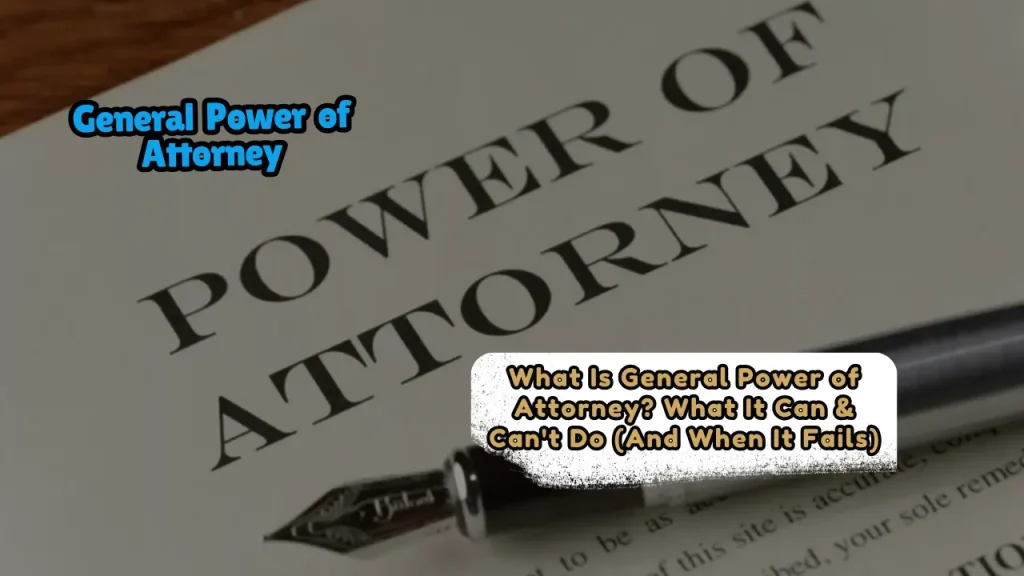What Is General Power of Attorney? What It Can & Can’t Do (And When It Fails)
A General Power of Attorney (POA) is a legal document that grants someone broad authority to manage your financial, legal, and business affairs while you’re still competent. However, it automatically ends if you become incapacitated and cannot be used for medical decisions or post-death arrangements.
“Why 70% of General POAs Fail When You Need Them Most”
Imagine handing your sibling a General Power of Attorney to handle your bills while you’re on a 6-month work assignment abroad. But if you’re injured in a car accident and fall into a coma, that POA instantly becomes worthless—leaving your family locked out of your accounts and scrambling to pay your mortgage. This is the harsh reality of General POAs: they’re powerful tools with a critical expiration date. Let’s break down what they are, when to use them, and why they’re often misunderstood.
Table of Contents
What is a General Power of Attorney?
A General POA is a short-term delegation of authority that lets your agent:
- Manage bank accounts and pay bills
- File taxes
- Buy/sell property or investments
- Sign legal documents
Key Features:
Broad Powers: Covers most financial/legal matters.
Immediate Effect: Active as soon as you sign it.
Temporary: Ends when revoked, you die, or become incapacitated.
What a General POA CAN’T Do
Despite its flexibility, it has strict limits:
- No Medical Decisions: Requires a separate Healthcare POA.
- No Post-Incapacity Authority: Automatically voids if you’re mentally/physically unable to act.
- No Control After Death: Executors take over via your will.
- No Voting Rights: Can’t delegate your ballot access.
Example:
In 2022, a Texas court blocked an agent from using a General POA to sell a principal’s home after a stroke left them nonverbal (Texas Estates Code § 751.0021).
When to Use a General POA
- Travel or Temporary Absence: Manage bills while overseas.
- Business Deals: Let an agent sign contracts if you’re unavailable.
- Short-Term Delegation: Assist aging parents who are still competent.
Statistic Alert:
A 2023 LegalShield study found 34% of adults use General POAs for travel, but only 1 in 5 realize they expire upon incapacity.
Pros vs. Cons
| Pros | Cons |
| Quick to set up | Useless in emergencies |
| No court approval needed | High fraud risk if agent is untrustworthy |
| Covers wide range of tasks | Requires constant updates |
State-Specific Rules
- California (Probate Code § 4120): Must be notarized or signed with two witnesses.
- Florida (Statutes § 709.2102): Requires specific wording like “I intend for this document to be a General Power of Attorney.”
- Ohio (ORC § 1337.24): Allows oral revocation but recommends written notice.
Red Flag:
In New York, General POAs created before June 2021 may be invalid due to updated witness rules under General Obligations Law § 5-1501B.
For more comprehensive insights into the various POA options and guidance on selecting the right one, check out our article What Is a Limited (Special) Power of Attorney? What It Can & Can’t Do (And When It Fails).
How to Revoke a General POA
- Write a Revocation Letter: State clearly, “I revoke all powers granted to [Agent’s Name].”
- Notify Your Agent: Send via certified mail.
- Inform Third Parties: Banks, insurers, etc.
- Destroy Copies: Shred old documents.
Note: If you later create a Durable POA, specify that it replaces prior agreements.

General POA vs. Durable POA
| Factor | General POA | Durable POA |
| Incapacity | Terminates | Remains valid |
| Use Case | Short-term needs | Long-term planning (e.g., dementia) |
| Flexibility | Immediate but fragile | Requires trust but lasts longer |
FAQs
Can a General POA change my will?
No. Testamentary decisions (wills/trusts) require your direct action.
Is a General POA valid across state lines?
Most states honor out-of-state POAs, but banks may reject them if they don’t meet local rules.
Can I use it for my elderly parent?
Only if they’re mentally competent when signing. Otherwise, seek guardianship.
4 Critical Mistakes to Avoid
- Assuming It Covers Healthcare (It doesn’t—you need a Medical POA).
- Using Outdated Forms (Banks often reject pre-2020 templates).
- Not Specifying Limitations (Agents can overreach without clear boundaries).
- Ignoring State Laws (E.g., Florida requires two witnesses + notary).
Require a General POA? Key Resources
- AARP Free POA Forms (State-specific templates)
- LegalZoom Custom POAs (Attorney-reviewed)
- National Notary Association (Find local notaries)
Conclusion
A general power of attorney is like a Swiss Army knife—versatile, handy, but not meant for every job. It’s perfect for short-term or broad needs, like managing your life while you’re away or recovering. But its limits—especially the incapacity cutoff—mean it’s not a forever fix. If you’re planning for the long haul, you might need a durable or healthcare POA instead.
Before you sign anything, talk to a lawyer to ensure your general power of attorney fits your needs and follows your state’s rules. It’s a small step that can save big stress later. Want to know more? Keep reading for resources to guide you.
Disclaimer:
This article is for informational purposes only and does not constitute legal advice. Always consult a qualified attorney for guidance tailored to your specific situation.
About the Author

Sarah Klein, JD, is an experienced estate planning attorney who has helped clients with wills, trusts, powers of attorney, and probate matters. At All About Lawyer, she simplifies complex estate laws so families can protect their assets, plan ahead, and avoid legal headaches during life’s most sensitive moments.
Read more about Sarah
